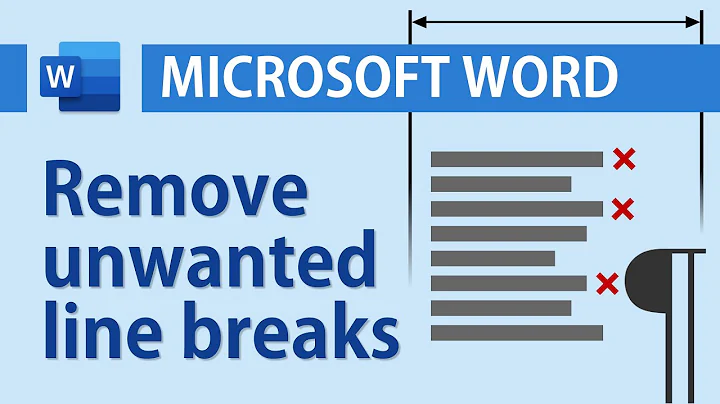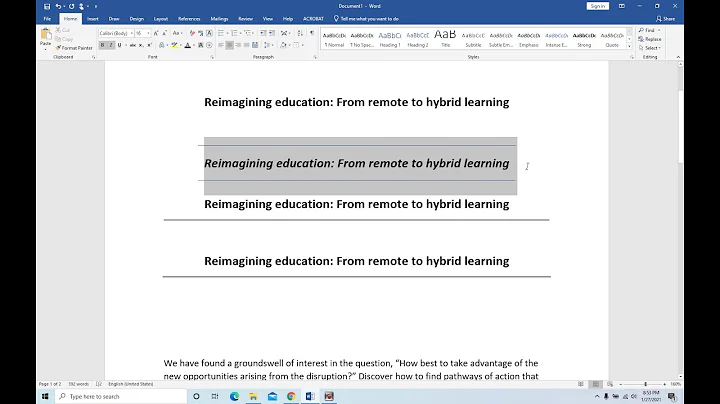How can I delete a newline if it is the last character in a file?
Solution 1
perl -pe 'chomp if eof' filename >filename2
or, to edit the file in place:
perl -pi -e 'chomp if eof' filename
[Editor's note: -pi -e was originally -pie, but, as noted by several commenters and explained by @hvd, the latter doesn't work.]
This was described as a 'perl blasphemy' on the awk website I saw.
But, in a test, it worked.
Solution 2
You can take advantage of the fact that shell command substitutions remove trailing newline characters:
Simple form that works in bash, ksh, zsh:
printf %s "$(< in.txt)" > out.txt
Portable (POSIX-compliant) alternative (slightly less efficient):
printf %s "$(cat in.txt)" > out.txt
Note:
-
If
in.txtends with multiple newline characters, the command substitution removes all of them.Thanks, Sparhawk (It doesn't remove whitespace characters other than trailing newlines.) - Since this approach reads the entire input file into memory, it is only advisable for smaller files.
-
printf %sensures that no newline is appended to the output (it is the POSIX-compliant alternative to the nonstandardecho -n; see http://pubs.opengroup.org/onlinepubs/009696799/utilities/echo.html and https://unix.stackexchange.com/a/65819)
A guide to the other answers:
-
If Perl is available, go for the accepted answer - it is simple and memory-efficient (doesn't read the whole input file at once).
-
Otherwise, consider ghostdog74's Awk answer - it's obscure, but also memory-efficient; a more readable equivalent (POSIX-compliant) is:
-
awk 'NR > 1 { print prev } { prev=$0 } END { ORS=""; print }' in.txt -
Printing is delayed by one line so that the final line can be handled in the
ENDblock, where it is printed without a trailing\ndue to setting the output-record separator (OFS) to an empty string. -
If you want a verbose, but fast and robust solution that truly edits in-place (as opposed to creating a temp. file that then replaces the original), consider jrockway's Perl script.
Solution 3
You can do this with head from GNU coreutils, it supports arguments that are relative to the end of the file. So to leave off the last byte use:
head -c -1
To test for an ending newline you can use tail and wc. The following example saves the result to a temporary file and subsequently overwrites the original:
if [[ $(tail -c1 file | wc -l) == 1 ]]; then
head -c -1 file > file.tmp
mv file.tmp file
fi
You could also use sponge from moreutils to do "in-place" editing:
[[ $(tail -c1 file | wc -l) == 1 ]] && head -c -1 file | sponge file
You can also make a general reusable function by stuffing this in your .bashrc file:
# Example: remove-last-newline < multiline.txt
function remove-last-newline(){
local file=$(mktemp)
cat > $file
if [[ $(tail -c1 $file | wc -l) == 1 ]]; then
head -c -1 $file > $file.tmp
mv $file.tmp $file
fi
cat $file
}
Update
As noted by KarlWilbur in the comments and used in Sorentar's answer, truncate --size=-1 can replace head -c-1 and supports in-place editing.
Solution 4
head -n -1 abc > newfile
tail -n 1 abc | tr -d '\n' >> newfile
Edit 2:
Here is an awk version (corrected) that doesn't accumulate a potentially huge array:
awk '{if (line) print line; line=$0} END {printf $0}' abc
Solution 5
gawk
awk '{q=p;p=$0}NR>1{print q}END{ORS = ""; print p}' file
Related videos on Youtube
Todd Partridge 'Gen2ly'
Linux fan, wanna be lover, fairly average.
Updated on May 06, 2022Comments
-
Todd Partridge 'Gen2ly' almost 2 years
I have some files that I'd like to delete the last newline if it is the last character in a file.
od -cshows me that the command I run does write the file with a trailing new line:0013600 n t > \nI've tried a few tricks with sed but the best I could think of isn't doing the trick:
sed -e '$s/\(.*\)\n$/\1/' abcAny ideas how to do this?
-
SourceSeeker over 14 yearsnewline is only one character for unix newlines. DOS newlines are two characters. Of course, literal "\n" is two characters. Which are you actually looking for?
-
pavium over 14 yearsAlthough the representation might be
\n, in linux is is one character -
 KriptSkitty over 14 yearsCan you elaborate on why you want to do this? Text files are supposed to end with an end-of-line, unless they are entirely empty. It seems strange to me that you'd want to have such a truncated file?
KriptSkitty over 14 yearsCan you elaborate on why you want to do this? Text files are supposed to end with an end-of-line, unless they are entirely empty. It seems strange to me that you'd want to have such a truncated file? -
pavium over 14 yearsThe usual reason for doing something like this is to delete a trailing comma from the last line of a CSV file. Sed works well, but newlines have to be treated differently.
-
Todd Partridge 'Gen2ly' over 14 yearsYeah this is for Linux so thanks for correcting that newline is just one character. Fixed in post.
-
 tchrist almost 11 yearsPlease never delete the final newline in a file of newline-terminated lines. It screws up all kinds of things.
tchrist almost 11 yearsPlease never delete the final newline in a file of newline-terminated lines. It screws up all kinds of things. -
 Cory Mawhorter about 9 years@ThomasPadron-McCarthy "In computing, for every good reason there is to do something there exists a good reason not to do it and visa versa." -Jesus -- "you shouldn't do that" is a horrible answer no matter the question. The correct format is: [how to do it] but [why it may be bad idea]. #sacrilege
Cory Mawhorter about 9 years@ThomasPadron-McCarthy "In computing, for every good reason there is to do something there exists a good reason not to do it and visa versa." -Jesus -- "you shouldn't do that" is a horrible answer no matter the question. The correct format is: [how to do it] but [why it may be bad idea]. #sacrilege -
wisbucky over 5 yearsOne reason to remove the trailing newline is if you're piping the string to somewhere else, and you can't have a trailing newline.
-
-
SourceSeeker over 14 yearsThat takes out all the newlines. Equivalent to
tr -d '\n' -
 silbana over 14 yearsYou can make it safer by using
silbana over 14 yearsYou can make it safer by usingchomp. And it beats slurping the file. -
Todd Partridge 'Gen2ly' over 14 yearsThis works good too, probably less blasphemous than paviums's.
-
Todd Partridge 'Gen2ly' over 14 yearsGood original way to think about it. Thanks Dennis.
-
Todd Partridge 'Gen2ly' over 14 yearsBlasphemy though it is, it works very well. perl -i -pe 'chomp if eof' filename. Thank you.
-
Todd Partridge 'Gen2ly' over 14 yearsStill looks like a lot of characters to me... learning it slowly :). Does the job though. Thanks ghostdog.
-
Ether over 14 yearsThe funny thing about blasphemy and heresy is it's usually hated because it's correct. :)
-
SourceSeeker over 14 yearsYou are correct. I defer to your
awkversion. It takes two offsets (and a different test) and I only used one. However, you could useprintfinstead ofORS. -
Rob Kennedy over 14 yearsSinan, although Linux and Unix might define text files to end with a newline, Windows poses no such requirement. Notepad, for example, will write only the characters you type without adding anything extra at the end. C compilers might require a source file to end with a line break, but C source files aren't "just" text files, so they can have extra requirements.
-
ysth over 14 yearsbut that has the disadvantage of not reseting ownership/permissions for the file...err, wait...
-
ysth over 14 yearsin that vein, most javascript/css minifiers will remove trailing newlines, and yet produce text files.
-
 silbana over 14 years@Rob Kennedy and @ysth: There is an interesting argument there as to why such files are not actually text files and such.
silbana over 14 years@Rob Kennedy and @ysth: There is an interesting argument there as to why such files are not actually text files and such. -
BCoates over 12 yearsyou can make the output a pipe with process substitution:
head -n -1 abc | cat <(tail -n 1 abc | tr -d '\n') | ... -
SourceSeeker over 12 years@BCoates: That doesn't do the same thing. Yours only gives the last line (without a newline). The OP wants the whole file with only the last newline removed. Your pipeline would work like this:
head -n -1 ifscomma && cat <(tail -n 1 ifscomma | tr -d '\n')orhead -n -1 ifscomma | cat - <(tail -n 1 ifscomma | tr -d '\n'). In the latter one, the hyphen causescatto concatenate what comes across the pipe with the output of the process substitution. Otherwise, the output ofheadwould be ignored. -
SourceSeeker over 12 yearsI forgot to edit the name of the file in my previous comment to change it from the test file I was using to the sample name "abc":
s/ifscomma/abc/g -
hese about 12 yearsThis worked faster than the perl command on a 1MB file for me. Great thanks!
-
Olumide almost 12 yearsIts not pretty but it works. Give it up for the swiss army chainsaw.
-
Romuald Brunet over 11 yearsSmall correction: you can use
perl -pi -e 'chomp if eof' filename, to edit a file in-place instead of creating a temporary file -
mklement0 over 11 yearsHalfway there; complete approach here.
-
Denis Barmenkov about 11 yearsos.path.isfile() will tell you about file presence. Using try/except might catch a lot of different errors :)
-
rudimeier about 11 yearsUsing -c instead of -n for head and tail should be even faster.
-
aditsu quit because SE is EVIL about 11 years
perl -pie 'chomp if eof' filename-> Can't open perl script "chomp if eof": No such file or directory;perl -pi -e 'chomp if eof' filename-> works -
 Yevhen Pavliuk almost 11 years
Yevhen Pavliuk almost 11 yearsawk '{ prev_line = line; line = $0; } NR > 1 { print prev_line; } END { ORS = ""; print line; }' filethis should be easier to read. -
technosaurus over 10 yearsI found the cat-printf combo out by accident (was trying to get the opposite behavior). Note that this will remove ALL trailing newlines, not just the last.
-
ChrisV about 10 yearsFor me, head -n -1 abc removed the last actual line of the file, leaving a trailing newline; head -c -1 abc seemed to work better
-
Kyle Strand about 9 yearsWhy is
-pie"blasphemy," and why doesn't it behave the same as-pi -e? Anyone know? -
 Admin about 9 years@KyleStrand I don't know about the "blasphemy" part other than perhaps the mere fact of recommending perl could be considered blasphemy on an awk website, but the reason
Admin about 9 years@KyleStrand I don't know about the "blasphemy" part other than perhaps the mere fact of recommending perl could be considered blasphemy on an awk website, but the reason-pieand-pi -edon't work the same way is that the-ioption takes an optional argument.-pieuseseas the argument to-i, specifying the backup suffix, and then interprets'chomp if eof'as a filename, since it isn't preceded by an-eoption.-pi -eomits the argument for-i, and allows-eto be treated as an option. -
mklement0 about 9 yearsWorks, but removes all trailing newlines.
-
mklement0 about 9 yearsEffectively the same as the accepted answer, but arguably clearer in concept to non-Perl users. Note that there's no need for the
gor the parentheses aroundeof:perl -pi -e 's/\n$// if eof' your_file. -
mklement0 about 9 yearsVerbose, but both fast and robust - seems to be the only true in-place file-editing answer here (and since it may not be obvious to everyone: this is a Perl script).
-
Dakkaron over 8 yearsBest solution of all so far. Uses a standard tool that really every Linux distribution has, and is concise and clear, without any sed or perl wizardry.
-
 Admin over 7 yearsThis is a decent way if it's not too expensive (repetitive).
Admin over 7 yearsThis is a decent way if it's not too expensive (repetitive). -
 done over 7 yearsHow about:
done over 7 yearsHow about:awk 'NR>1 {print p} {p=$0} END {printf $0}' file. -
m13r about 7 yearsThis also turns
\r\nto\n -
Chris Stryczynski almost 7 yearsThis has issues when
\nis present. As it gets converted to a new line. -
Thor over 6 yearsAlso seems to work for multi-line files it the
$(...)is quoted -
Karl Wilbur over 6 yearsNice solution. One change is that I think I'd use
truncate --size=-1instead ofhead -c -1since it just resizes the input file rather than reading in the input file, writing it out to another file, then replacing the original with the output file. -
liran about 6 yearsisn't all of Perl blasphemy? ;)
-
Brian Hannay almost 6 yearstruncate: missing file operand
-
wisbucky over 5 yearsNote that
head -c -1will remove the last character regardless if it is a newline or not, that's why you have to check whether the last character is a newline before you remove it. -
wisbucky over 5 yearsI think this will only remove it if the last line is blank. It will not remove the trailing newline if the last line is not blank. For example,
echo -en 'a\nb\n' | sed '${/^$/d}'will not remove anything.echo -en 'a\nb\n\n' | sed '${/^$/d}'will remove since the entire last line is blank. -
wisbucky over 5 yearsHere's a
sedsolution that works even for a non-blank last line: stackoverflow.com/a/52047796 -
michael over 5 yearsjust another variant on the "one liner" with
catexamples show in the comments (no pipe necessary, using only process substitution, feel free to change theheadortailoptions as necessary):cat <(head -n -1 abc) <(tail -n 1 abc | tr -d '\n') -
michael over 5 yearsit's just missing the trailing filename in the example, i.e.,
[ -z $(tail -c1 filename) ] && truncate -s -1 filename(also, in reply to the other comment, thetruncatecommand does not work with stdin, a filename is required) -
michael over 5 yearsdefinitely need to quote that...
/bin/echo -n "$(cat infile)"Also, I'm not sure what the max len ofechoor the shell would be across os/shell versions/distros (I was just googling this & it was a rabbit hole), so I'm not sure how portable (or performant) it actually would be for anything other than small files -- but for small files, great. -
 Robin A. Meade over 4 years@sorontar The first argument to
Robin A. Meade over 4 years@sorontar The first argument toprintfis the format argument. Thus if the input file had something that could be interpreted as a format specifier like%d, you'd get an error. A fix would be to change it toprintf "%s" $0 -
user963601 over 4 years
cat foo | perl -pe 'chomp if eof'removes the newline fromfoo, butgit statusstill reports a diff. Maybe the file was\r\nandperljust removes the\n? -
 Edward Falk about 4 yearsUnfortunately does not work on Mac. I suspect it doesn't work on any BSD variant.
Edward Falk about 4 yearsUnfortunately does not work on Mac. I suspect it doesn't work on any BSD variant. -
 Nathan almost 4 years@Ether A fun read about that
Nathan almost 4 years@Ether A fun read about that








